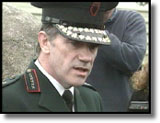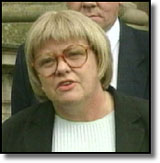
|
Violence Across Northern Ireland
Rioting, car hijackings and gun attacks spread across Ulster on Sunday, after the police and the British army forced a Protestant march through the Garvaghy Road, the main Catholic neighbourhood in Portadown, County Armagh.
|

|
|
Burnt-out train Militants are taking "revenge" |
A policewoman was wounded in the face in Coalisland, 15 miles northwest of Belfast, when a man wielding a shotgun ran out of a nearby pub and shot at her. Her wounds are said to be not life-threatening.
In south Belfast, another unidentified gunman fired five shots at police on a bridge that divides Catholic and predominantly Protestant areas; nobody was injured. More incidents of violence were reported across the province.
During nationalist demonstrations there were calls for IRA revenge. "There'll be no IRA cease-fire now," said Gerry Kelly, a Belfast man who spent several years in prison for an attempted IRA bombing. He predicted the soldiers would "have to pay for a start. It's been demonstrated clearly to us today that the only thing the British government understands is force."
Mark Devenport reports -- Dur: 1:55
The Irish Prime Minister, Bertie Ahern, expressed disappointment at the decision to allow the march. The IRA's political wing, Sinn Fein, said it was outraged.

|
| Ronnie Flanagan, allowing the march to go ahead - "the lesser of two evils" |
|
|
| "a stark choice" |
Balancing "Two Evils"
The RUC Chief Constable, Ronnie Flannagan, had announced his decision to let the march go ahead early on Sunday morning. He said he had made his decision after weighing up 'two evils'.
"The choice I was left with was a simple, stark choice in terms of balancing two evils," he said. "Each evil threatened to bring about serious violence. I'm talking about loss of life." He apologised to residents of Garvaghy Road for the fact that the parade had to go ahead and said conditions had been imposed to make sure it would pass quietly. "I want to subject them to minimum violence," he said.
Full Political Support For March Decision

|
| Mowlam "did her utmost" |
|
|
| The Northern Ireland Secretary admits failure |
On the steps of Stormont Castle in Belfast Ms Mowlam told a news conference: "Northern Ireland has seen far too many tragedies. Peace and the preservation of life in the end matters most of all." The right to peaceful assembly, the right to march, was a basic right. But she said all rights carried responsibilities and should be, "exercised with respect for the rights and freedoms of others." Ms Mowlam said the decision by the RUC chief constable to allow the Drumcree march to go ahead was taken to preserve public safety.
The Drumcree March

|
| Orange parade enters Catholic area |

|
| Police clear Garvaghy Road before the Orange parade |
Peter Hunt reports from Drumcree -- Dur: 1:58
Nationalist residents, held back by police and troops, hurled abuse and banged dustbin lids as the parade passed between lines of vehicles belonging to the security forces. Bottles were thrown but the Orangemen marched in silence, and the parade itself passed off peaceafully.
Day Began in Violence
The tense waiting game of the past few days exploded into violence on Saturday night when police and troops moved in quickly to sealed off the Garvaghy Road.
Ten civilians and three police were hurt in the clashes when RUC officers and troops in riot gear moved into the road in a surprise early-morning swoop at about 3.30am. Hundreds of residents confronted two lines of police and petrol bombs and bricks were hurled at officers. Road signs were ripped from the ground and bricks pulled from driveways to use as ammunition.
A police spokesman said those injured were "walking wounded" and not seriously hurt. But people in the crowd said three civilians were hit by plastic bullets.
Diana, Princess of Wales, 1961-1997
Conference 97
Devolution
The Archive
News |
Issues |
Background |
Parties |
Analysis |
TV/Radio/Web
Interactive |
Forum |
Live |
About This Site
News |
Issues |
Background |
Parties |
Analysis |
TV/Radio/Web
Interactive |
Forum |
Live |
About This Site
© BBC 1997 |
politics97@bbc.co.uk |
